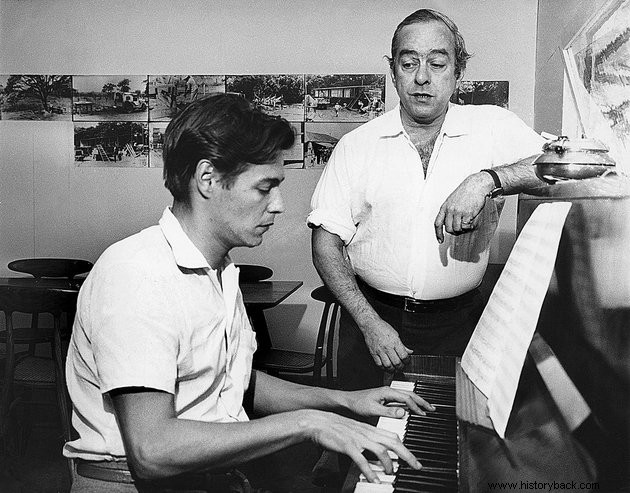Antônio Carlos Brasileiro de Almeida Jobim,Tom Jobim , was a Brazilian composer, guitarist, pianist, flutist, arranger and producer.
He recorded more than thirty albums, was one of the inventors of Bossa Nova and is considered one of the biggest names in world music in the 20th century.
Biography of Tom Jobim
Tom Jobim was born in the city of Rio de Janeiro, on January 25, 1927, in a family that appreciated music and nature. He studied piano, guitar, transverse flute and mouth harmonica.
He has lived in different neighborhoods of Rio and studied in several schools. At the age of 14 he starts studying piano finding his true vocation.
Tom Jobim's Career and Partners
In 1956, he would be introduced to the most prolific partner of his career, the diplomat and poet Vinícius de Moraes.
This partnership would change the life of the artist and the world song, as both wrote one of the most performed songs in the world:“Girl from Ipanema”.

Tom Jobim also wrote with Newton de Oliveira, Chico Buarque, Paulo César Pinheiro and Edu Lobo. Among the Brazilian interpreters who have consecrated his work we can mention Elizete Cardoso, João Gilberto, Elis Regina, Gal Costa, Miúcha and Paulo Caymmi.
Foreign singers such as Astrud Gilberto, Frank Sinatra and Ella Fitzgerald also recorded their songs on albums that became historic.
In addition, musicians of different nationalities have focused on the work of Tom Jobim:from the American saxophonist Stan Getz, the Canadian pianist Oscar Peterson, to the Japanese instrumentalist Sadao Watanabe.
In the late 1970s and 1980s, Tom Jobim composed soundtracks for TV Globo miniseries such as “O Tempo e o Vento”, based on the work of Érico Veríssimo.
For the cinema he set music for the film “Gabriela” (1983), by Bruno Barreto, adapted from the book by Jorge Amado.
He passed away in New York City due to surgical complications in 1994.
Lyrics and Themes of Tom Jobim's Songs
Tom Jobim's work is vast, but we can mention some themes that are constantly addressed in his lyrics and melodies.
Rio de Janeiro
In love with the city where Tom Jobim was born, he dedicated verses and melodies to it. “Copacabana” (with Billy Blanco, 1954), “Corcovado” (1960) and “Samba do Avião” (1962) are just examples of hymns of love to Rio de Janeiro.
See also:History of SambaNature
Nature was one of the main sources of inspiration for the composer. In addition to singing it in verse, he simulated the singing of birds, the noise of rain and wind in the melodies.
His last address was the Jardim Botânico neighborhood in Rio de Janeiro. The singer was often seen in the Botanical Garden, listening to birds singing and observing the flora. "Chovendo na Roseira" (1971) and "Águas de Março" (1972), are reflections of this admiration.
See also:bossa novaWomen
Women and love relationships have also found their place in Tom Jobim's work.
From the universal “Girl from Ipanema” (with Vinícius de Moraes, 1962), to “Ela é carioca” (idem, 1963), female beauty was celebrated by the composer.
Likewise, love, with its joys and difficulties, is sung in several pieces. Two examples are “Só Tinha que ser com Você” (with Aloysio Oliveira, 1964) and “Retrato em Branco e Preto” (with Chico Buarque, 1968).
See also:MPB - Brazilian Popular MusicSymphonic Music
Despite his erudite training, Tom Jobim wrote little for this genre. A self-confessed admirer of Villa-Lobos, who he came to know, the maestro from Rio de Janeiro was the author of the Sinfonia da Alvorada (1962), a piece commissioned by President Juscelino Kubitschek for the inauguration of Brasília. The lyrics were in charge of Vinícius de Moraes.
Girl from Ipanema
Tom Jobim's most famous song is "Garota de Ipanema", composed in partnership with Vinícius de Moraes. The song won numerous versions, from the pure bossa-nova style interpretations to the dance music beat.
One of the most popular is the duet performed with singer Frank Sinatra, a big fan of the Brazilian musician. Here, he sings in English while Jobim sings in Portuguese.
Frank Sinatra - "The Girl From Ipanema" (Concert Collection)Quotes by Tom Jobim
Tom Jobim was notorious for coining ironic phrases and did not hide his impatience in the face of certain questions asked by journalists.
"I come back to get bored. To answer that kind of question. To be one of the 5% of Brazilians who pay income tax. To lose my appetite or die of indigestion. I come back because I never left here." - when asked why he had returned to Brazil.
"Brazil is not for beginners." - in response to the book "Brazil for Beginners", by Peter Kelleman.
"An American said that the 'Girl' feeling passes. The guy is there working, drilling the street, breaking quarries, and takes a look. That's a universal feeling. The guy stops drinking his beer and looks at the girl, is not?" - about "Girl from Ipanema".
Fun facts about Tom Jobim
- According to Universal, which owns the rights to “Girl from Ipanema”, it is the second most played song in the world, behind “Yesterday”, by the Beatles.
- Despite playing several instruments, Tom Jobim felt better playing and composing at the piano. His famous guitar image with Frank Sinatra was the idea of American producers in order to reinforce the Latin stereotype.
- Rio de Janeiro International Airport is called Galeão/Tom Jobim in honor of the musician. It is the second airport in the world to honor a musician next to New Orleans' Louis Armstrong International Airport.
- Tom Jobim was honored by the Escola de Samba da Mangueira, in 1992, with the theme “If all were equal to you”. The School ranked 6th this year.
